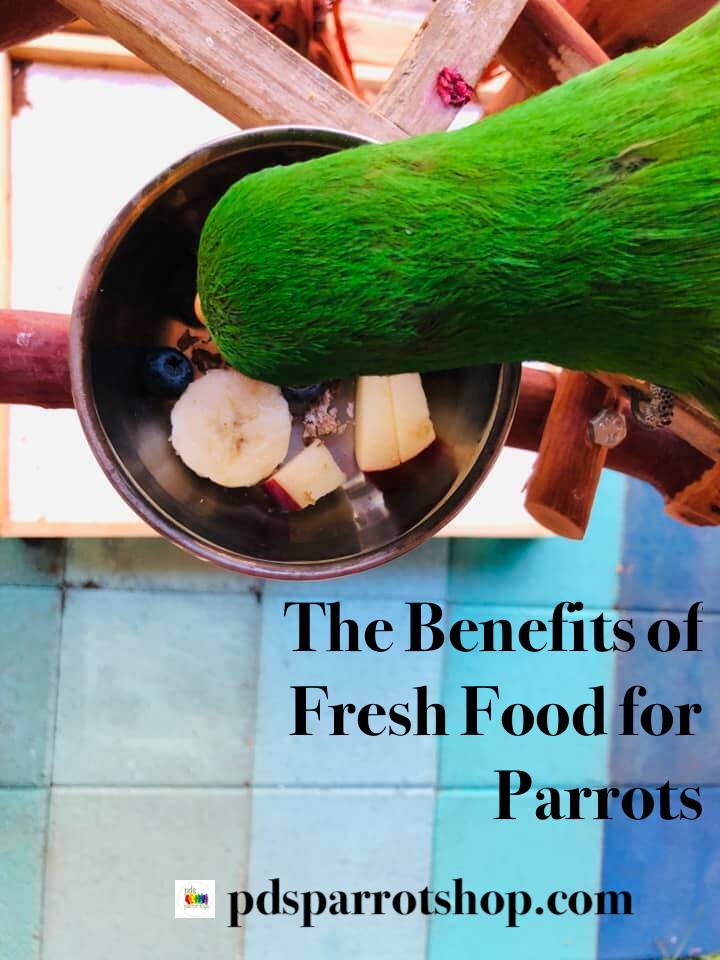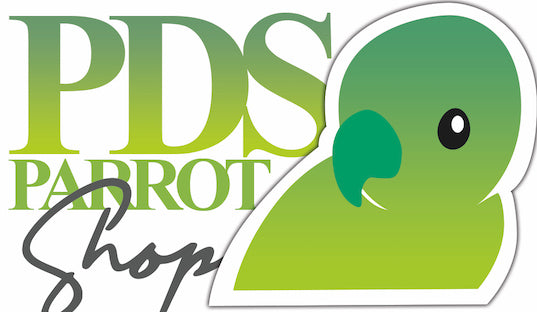
The Benefits of Fresh Food for Parrots| Why It’s Essential for Your Bird’s Health
Share
A Parrot’s diet should consist of a variety of fresh fruits, vegetables, and healthy seeds, nuts and pellets. A diet rich in fresh foods has many benefits for parrots including improved digestion, stronger immunity, and increased energy levels. For bird owners looking to take their parrot’s health to the next level, check out The Science of Avian Nutrition, a comprehensive guide to everything you need to know about healthy feeding.
A healthy diet is important for all pets, but it is especially important for parrots. This is because they are susceptible to a number of health problems due to their sensitive digestive system. A diet rich in fresh foods can help improve digestion and prevent problems such as diarrhea and GI tract infections.

Pin Me!
In addition, fresh foods are packed with nutrients that can help boost a parrot’s immune system. This is important because parrots are prone to respiratory infections. (caused by deficiency in vitamin A) Fresh foods are also a great source of energy for parrots. This is important because parrots are very active birds that need a lot of energy to stay healthy and happy.
If you are looking for ways to improve your parrot’s diet, then adding fresh foods is a great place to start. Keep reading to learn more about the benefits of fresh food for parrots!
For practical ways to serve fresh food daily, including recipes and storage tips, visit our Bird Chop guide.
The Essentials of Parrot Nutrition
First and foremost, it's imperative to recognize the dietary no-nos for your feathered friends. Steer clear of the following:
- Say No to Avocado and Tomato: These innocent-looking ingredients can spell disaster for your parrot's health.
- Avoid Salty and Junk Food: Just as they are detrimental to us, these items are equally harmful to your avian companions.
- Chocolate - A Strict No: Theobromine in chocolate is toxic to birds; never let them nibble on this sweet temptation.
Parrots are natural foragers
Parrots are naturally drawn to fresh and varied foods, much like their wild cousins. This is because, in nature, parrots survive by foraging for fresh foods such as fruit, nuts, and insects. In their domesticated environment, parrots will naturally seek out fresh foods and create a balanced diet from their foraging. As such, providing them with fresh fruits and vegetables is an important part of creating a healthy diet for parrots. Knowing that parrots are natural foragers, it is important to create a diet that is reminiscent of the natural environment. This means offering them a wide variety of fruits and vegetables, as well as seeds, nuts, and pellets. The best way to do this is to provide fresh foods in addition to fulfill their natural instinct to forage.

Nourishing Your Parrot - Our Approach
At our aviary, we abide by a simple mantra: balance is key. We believe that moderation is the linchpin to a wholesome diet for our cherished birds. Our avian menu includes:
-
A Bounty of Fruits, Veggies, and Greens: Every day, our feathered friends indulge in a colorful assortment of nature's gifts.
-
Grains: A crucial source of energy and nutrients for your parrot's vitality.
-
Seed Mix: While we advocate diversity, seeds are a part of our repertoire, albeit not an exclusive diet.
-
Nutty Delights: Nuts are a prized component, offering essential fats and proteins.
-
Pellets: The Lowdown:
A Grain of Caution with Colored Pellets
Colored pellets may catch your eye, but they come with a caveat. Artificial dyes used in these pellets have been linked to behavioral and health issues in birds.
The Virtues of Non-Colored Pellets in Moderation
We recommend non-colored pellets, but exercise caution:
- Vigilant Ingredient Scrutiny: Not all pellets are created equal; meticulously read the ingredient list.
- Follow Instructions to the Letter: Adhere to the feeding guidelines provided on the pellet packaging.
Freshness is Paramount
For us, freshness is non-negotiable. Every day, our parrots enjoy a smorgasbord of:
- Fresh Fruits, Veggies, and Greens: Be it a crisp salad or a steamed vegetable medley, we ensure our parrots receive the best of the produce aisle. Adding sprouts and nuts further enriches their meal.
Beware the Dried Fruit Trap
Dried fruits may seem like a convenient snack, but they are essentially sugar-laden candies. Both for humans and pets, they are best avoided in favor of fresh alternatives.
Individual Variations and Considerations
Our dietary regimen has proven effective for most of our avian companions. However, it's essential to acknowledge that every parrot is unique. Some may prove finicky when it comes to fresh foods, necessitating creative solutions like birdie bread to sneak in those essential veggies.
A Note on Medical Diets
Finally, always keep your parrot's medical needs in mind. If your feathered friend requires a specialized diet due to health issues, it's imperative to adhere to the prescribed regimen.
What should I do if my parrot refuses to eat fresh fruits and vegetables?
Parrots can be notoriously picky eaters. If your feathered friend is hesitant about fresh produce, try incorporating them into their diet gradually. You can also experiment with different preparation methods and combinations to find what they enjoy. Learn how to convert your birds diet with easy steps and lots of patience.

Are there any specific fruits and vegetables that are especially beneficial for parrots?
Yes, some fruits and vegetables are particularly nutritious for parrots. Consider including foods like berries, sweet potato, leafy greens, and bell peppers in their diet for essential vitamins and minerals.
For a complete guide, check out our cookbook or learn about what parrots eat.
How can I transition my parrot from a seed-only diet to a healthier one?
Transitioning your parrot to a more balanced diet may take time and patience. Start by gradually reducing the amount of seeds in their diet while introducing fresh foods. Monitor their progress and consult with an avian veterinarian if needed.
Can parrots eat cooked food?
Yes, parrots can consume cooked foods as long as they are safe and free from harmful ingredients. Some parrots enjoy warm, cooked grains and vegetables.
Is it okay to give my parrot treats occasionally?
Occasional treats are acceptable, but they should be given sparingly. Ensure that the treats are safe for parrots and do not compromise their overall diet.
What are some signs that my parrot may have dietary issues or health concerns?
Watch for signs like changes in appetite, weight loss, abnormal droppings, or a decrease in activity. If you notice any of these, consult with an avian veterinarian immediately. Learn about obesity in birds and why diet is so important.
Conclusion
A diet rich in fresh foods is essential for parrots to stay healthy and happy. Fresh fruits and vegetables are packed with nutrients that can help improve digestion and boost a parrot’s immune system. In addition, feeding fresh foods can be easy and fun, and your parrot will love the taste of these foods. Fresh foods are the best way to ensure that your parrot gets all the nutrients they need to stay healthy and happy. Each parrot is unique, so adapt your approach to suit their individual preferences and consult with a veterinarian if you have concerns.
PDS parrot shop created a chop mix with healthy grains, seeds and spices which creates a great base for fresh veggies and fruits. This chop is served to every parrot in our sanctuary.
Need help going shopping for fresh food? Check out our Shopping List for Bird Chop
Cookbook
The Science of Avian Nutrition
Author: Monika Sangar
Co-founder of Prego Dalliance Sanctuary, Artisan of PDS Parrot Shop
Monika Sangar is a parrot rescuer, bird food chef, and toy designer with over a decade of experience in avian care and nutrition. She is the founder of Prego Dalliance Sanctuary and the author of The Science of Avian Nutrition, a cookbook dedicated to fresh, healthy meals for parrots. Explore more bird care tips and bird toys at PDS Parrot Shop!

1 comment
My Red-Sided Eclectus male, Gizmo, was very sick indeed with a growth in his abdomen that pressed up against the lungs of his tiny air sacks, which also had a fungus. This caused his feathers to go black in places all over his body and he became sad and weak. He was more prone to infections and his grip was very poor and he would vomit after every meal. He was having far too many sunflower seeds. I hadn’t given it a second thought because supermarkets sell them in large packets, diabolically, as parrot food with happy, bright coloured parrots printed on their packages. Simply criminal! This also caused him to quickly develop Fatty Liver Disease where the liver swells and pushes up against their lungs, and the liver can fail altogether, of course, killing the bird or cutting it’s life very short. I had fiercely expensive avien vet bills and had to take him to a parrot rehabilitation centre called Brainy Birds. He has been there for nine months on 20% fresh fruit and 80% fresh vegetables and the occasional helping of seeds and nuts. It took him all of six months to start looking and behaving appreciably better and the black in his feathers have still not disappeared completely. I also fed him with Pronutro porridge through a syringe when he was three weeks old and had no feathers yet and that was a terribly thing to do. Specially designed pellets and special parrot porridge are designed for their diets. After nine months of consistent care and attention there he is finally starting to look and feel the way he ought to have in the first place. Washing hands before touching them is also vitally important and so is allowing them to sleep from dust to dawn as they would in the wild. Please think of your parrot’s happiness when you play with him or her and leave them be. Be sure to take them out of their cages and be loving and gentle with them and ask a professional for what diet is optimal for your species of parrot. They all require different proportions and never give them avocados or onions!